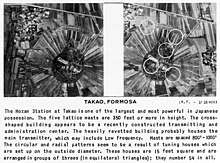Former Japanese Navy Fongshan Communication Center
The Former Japanese Navy Fongshan Communication Center (Chinese: 原日本海軍鳳山無線電信所; pinyin: Yuán Rìběn Hǎijūn Fèngshān Wúxiàn Diànxìn Suǒ) was one of the three radio stations operated in Taiwan by the former Imperial Japanese Navy located in Fengshan District, Kaohsiung, Taiwan.[1][2]
| Former Japanese Navy Fongshan Communication Center | |
|---|---|
原日本海軍鳳山無線電信所 | |

| |
| General information | |
| Location | Fengshan, Kaohsiung, Taiwan |
| Coordinates | 22°37′47.6″N 120°22′26.0″E |
| Completed | 1919 |
History

The radio station was the first radio station in Taiwan built by the Imperial Japanese Navy in 1919. Despite the military nature of the station, the channels were dedicated to civilian communication. After a major mechanical failure threatened the maritime safety, the Japanese built another radio station at Sankaiseki (Sankuaico)[lower-alpha 1] and consolidated it with the Hozan (Fongshan)[lower-alpha 1] station into the Takao[lower-alpha 1] Communication Unit in 1937. Once the Second Sino-Japanese War broke out soon after that, the Takao Communication Unit was used to maintain the south west Pacific communication of the Empire of Japan. It was also used as tactical radio to jam and monitor the US and British movements on the sea and in the air.
After the handover of Taiwan from Japan to the Republic of China in 1945, the station was taken over by the Republic of China Navy and converted it into a navy boarding house. Over the next decade, the navy boarding house was used by the navy as an interrogation facility for serviceman accused for political actions. In 1976, this place became the Mingde Disciplinary Camp of the navy where persistent disobedient servicemen were imprisoned. When the camp was decommissioned, it was turned into the Kaohsiung Military Dependent's Village Cultural Association.
Transportation
The building is accessible within walking distance north of Fongshan Junior High School Station of Kaohsiung MRT.
Notes
- Sankaiseki, Hozan and Takao were romanized in Japanese, the official language of Taiwan at the time. These place names were later romanized as Sankuaico, Fongshang and Kaohsiung respectively in Mandarin which is the official language of contemporary Taiwan government.
References
- "Cultural Heritage Kaohsiung > Cultural heritage > Historic Sites". Heritage.khcc.gov.tw. 2010-08-30. Retrieved 2014-05-28.
- "The Imperial Japanese Navy Fongshan Wireless Communications Station". Kaohsiung Travel. 4 June 2015.
- Air Intelligence Group, Division of Naval Intelligence. Japanese Electronics: Section-2 Communications (Report). Office of the Chief of Naval Operations, Navy Department. p. 2.12. Retrieved 2018-09-05.
| Wikimedia Commons has media related to Former Japanese Navy Fongshan Communication Center. |